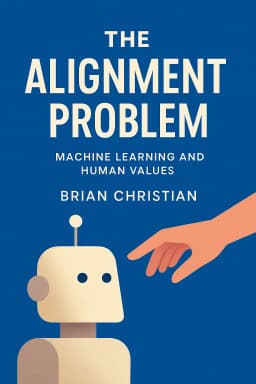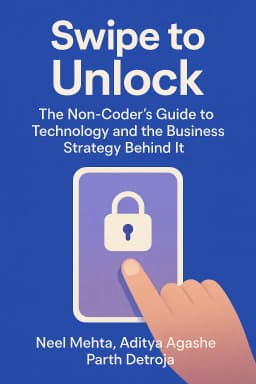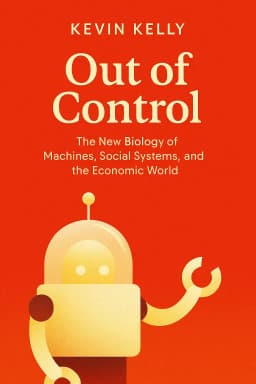
The Next OS: Engineering Humanity's Future
Golden Hook & Introduction
SECTION
Orion: Imagine for a moment that human evolution wasn't a slow, random crawl out of the primordial ooze, but an agile software project. For millennia, we've been running on 'Humanity 1.0,' a version developed by the unpredictable process of natural selection. But what if we're on the verge of a major release? What if we've finally gained access to our own source code?
Eric: That's a powerful way to put it. As an engineer, that's both the dream and the nightmare. Full access, full control.
Orion: Exactly. And that's the provocative question at the heart of Atul Jalan's book,, and it's what we're exploring today from the unique perspective of someone who actually writes code for a living, our guest, Eric. Welcome, Eric.
Eric: Thanks for having me, Orion. It's a topic that's impossible to ignore when you're in the tech world.
Orion: I can only imagine. Today we'll dive deep into this from two powerful perspectives. First, we'll explore the idea of humanity's 'Ultimate Refactor'—the shift from natural to artificial selection. Then, we'll discuss the profound ethical questions around 'Coding a New God,' as data and AI become our new sources of authority.
Deep Dive into Core Topic 1: The Ultimate Refactor
SECTION
Orion: So, Eric, as someone who builds complex systems, the idea of moving from a random process to a designed one must resonate. The book opens with these beautiful, almost accidental, evolutionary leaps. It talks about a fish, let's call her Wanda, who 400 million years ago, for reasons we'll never know, decided to crawl out of the sea. It wasn't a planned project; it was a single, momentous act that paved the way for all terrestrial life.
Eric: A single-point-of-failure that turned into our greatest feature.
Orion: Precisely. And then there's Lucy, the hominid from 3.2 million years ago. As the forests shrank, she chose to walk upright. Again, not a grand design, but an adaptation that proved incredibly energy-efficient—chimpanzees, for instance, use 75% more energy to walk than we do. These were slow, unpredictable, almost poetic changes. But the book's central argument, and this is a direct quote, is that "while we got here on the back of natural selection, what takes us forward will be, in all probability, artificial selection."
Eric: And that's the paradigm shift. You know, natural selection is like working with a legacy system that's a complete black box. You see the output—us—but the code is undocumented, and you can't debug the process. It's millions of years of spaghetti code.
Orion: I love that. So what are the new tools?
Eric: Well, now, with technologies like CRISPR, it's like we've finally opened the Integrated Development Environment, the IDE, for our own biology. We can literally set breakpoints in our DNA. It’s the ultimate 'find and replace' function for our own source code. We can search for the 'bug' that causes Huntington's disease and, theoretically, patch it.
Orion: The book describes this as riding a 'tiger we cannot get off.' It suggests this convergence of biology and technology is inevitable. As an engineer, someone who's comfortable with building and iterating, does that idea excite you or terrify you?
Eric: Honestly? It's both. The engineer in me, the ENTP visionary part, is absolutely exhilarated. The potential to eradicate genetic diseases, to enhance human capability, to fix fundamental flaws in our 'hardware'… that’s the kind of problem-solving that gets you up in the morning. It's the ultimate optimization challenge.
Orion: But the terror?
Eric: The terror comes from the process. In software development, we have rigorous testing. We have code reviews, we have unit tests, integration tests, and we have staging environments where we can see if a new feature is going to break everything before we release it to the public.
Orion: And for humanity?
Eric: What's the staging environment for humanity? We're pushing these changes directly to the production server. The 'undo' button is a lot more complicated. A bug in a software release might crash an app. A bug in our genetic code could be a catastrophe on a species-wide level. The potential for unintended consequences is, to put it mildly, significant. We're talking about deploying code that will self-replicate for generations.
Orion: So you're saying we're treating our own species like a beta test.
Eric: In a way, yes. And we're all the users. It's the most high-stakes release in history, and the documentation is being written as we go.
Deep Dive into Core Topic 2: Coding a New God
SECTION
Orion: That idea of pushing to production with no safety net is the perfect transition to our second point. It's not just our biology we're rewriting. The book argues we're also coding new systems of authority, maybe even a new God. And it all starts with pioneers like Alan Turing. The book doesn't just see him as a mathematician; it paints him as a mythological hero, a Prometheus who brought back the fire of computation to humanity.
Eric: And like Prometheus, he was punished for it. It's a tragic story. He gave us the foundational logic for the modern world, but the society of his time couldn't accept him for who he was.
Orion: Exactly. And his work, his 'Turing Machine,' was the seed. Now, we have the full-grown trees, and they are powerful. The book pivots from Turing to the modern-day 'gods' his work enabled. It talks about the Cambridge Analytica scandal, where a political consulting firm harvested the data of millions of Facebook users. They didn't need to read your private messages. They just needed to know what you 'liked.'
Eric: Right. They could build a scarily accurate psychological profile based on seemingly harmless data points. Your 'likes' for certain pages could predict your personality traits, your political leanings, your vulnerabilities, with a high degree of accuracy.
Orion: And this leads to the concept of 'Dataism,' which the author borrows from Yuval Noah Harari. Dataism is this emerging ideology, or religion, that sees the universe as a flow of data. It trusts algorithms to make the best decisions, because they can process more data than any human ever could. It promises to know you better than you know yourself.
Eric: We see this every day in our work. We build recommendation engines, personalization algorithms. The explicit goal is to 'know' the user, to anticipate their needs. When Netflix suggests a movie you end up loving, it feels like magic. It feels like it you. But the line between 'helpful' and 'manipulative' is incredibly thin. It's not a technical problem; it's a deeply ethical one.
Orion: The book frames this as a new religion. If Dataism is the new church, do you, as a software engineer, feel like a priest?
Eric: That's a heavy question. Maybe more like a reluctant acolyte, or a scribe in the monastery. We're the ones building these powerful oracles, but we don't always understand the full implications of the answers they give. We talk about 'algorithmic bias' in the industry, and we often treat it like a technical bug to be fixed.
Orion: But it's more than that?
Eric: Of course. It's a reflection of our own societal biases, baked into the data we feed the machine. If historical data shows that a certain demographic gets approved for loans less often, the AI will learn that pattern and perpetuate it, unless we explicitly code against it. So, in a way, we're not just building a new god; we're coding our own prejudices, our own original sins, into it. It's a mirror, and sometimes the reflection is ugly.
Orion: So the 'god' we're building is just a more efficient version of ourselves, with all our flaws.
Eric: Exactly. And it has the power to enact those flaws at a scale and speed that is unprecedented. That's the responsibility that people like me, and the tech leaders I'm interested in—the Jobs, the Gates, the Bezos' of the world—have to grapple with. They're not just building products; they're building the architecture of our future society.
Synthesis & Takeaways
SECTION
Orion: So we're at this incredible, and perhaps perilous, crossroads. We're moving from being the product of a slow, random evolution to becoming its designers, its engineers. And in that very process, the tools we're building—AI, big data, algorithms—are becoming our new sources of truth and authority.
Eric: It's a feedback loop. We're using our intelligence to create artificial intelligence, which in turn will augment our own intelligence, allowing us to build even more powerful AI. The acceleration is the key.
Orion: It's a dizzying thought. Which brings me to a final question for you, Eric. As we write the code for this next version of humanity, this 'Humanity 2.0,' what's the one comment—the one ethical principle—you'd insist on putting at the top of the source file for everyone to see?
Eric: Hmm. That's a great question. There are so many technical principles we follow, like 'Don't Repeat Yourself' or 'Keep It Simple.' But for this... for this project, it would have to be something more fundamental. I think I'd write: // This code affects real people. Test with empathy.
Orion: Test with empathy. Tell me more.
Eric: We can get so lost in the elegance of the algorithm, the efficiency of the system, the pure technical challenge. It's easy to forget that on the other side of the screen, or the other side of the genetic sequence, there's a person. A life. We can't just optimize for a metric. We have to optimize for human well-being. And that requires empathy. It requires us to have a 'human-in-the-loop,' not just for quality assurance, but as a core part of our fundamental design philosophy. The end-user is humanity itself, and we can't afford to forget that.
Orion: A powerful and necessary reminder. Test with empathy. Eric, thank you for bringing your unique and insightful perspective to this conversation.
Eric: My pleasure, Orion. It's given me a lot to think about.









